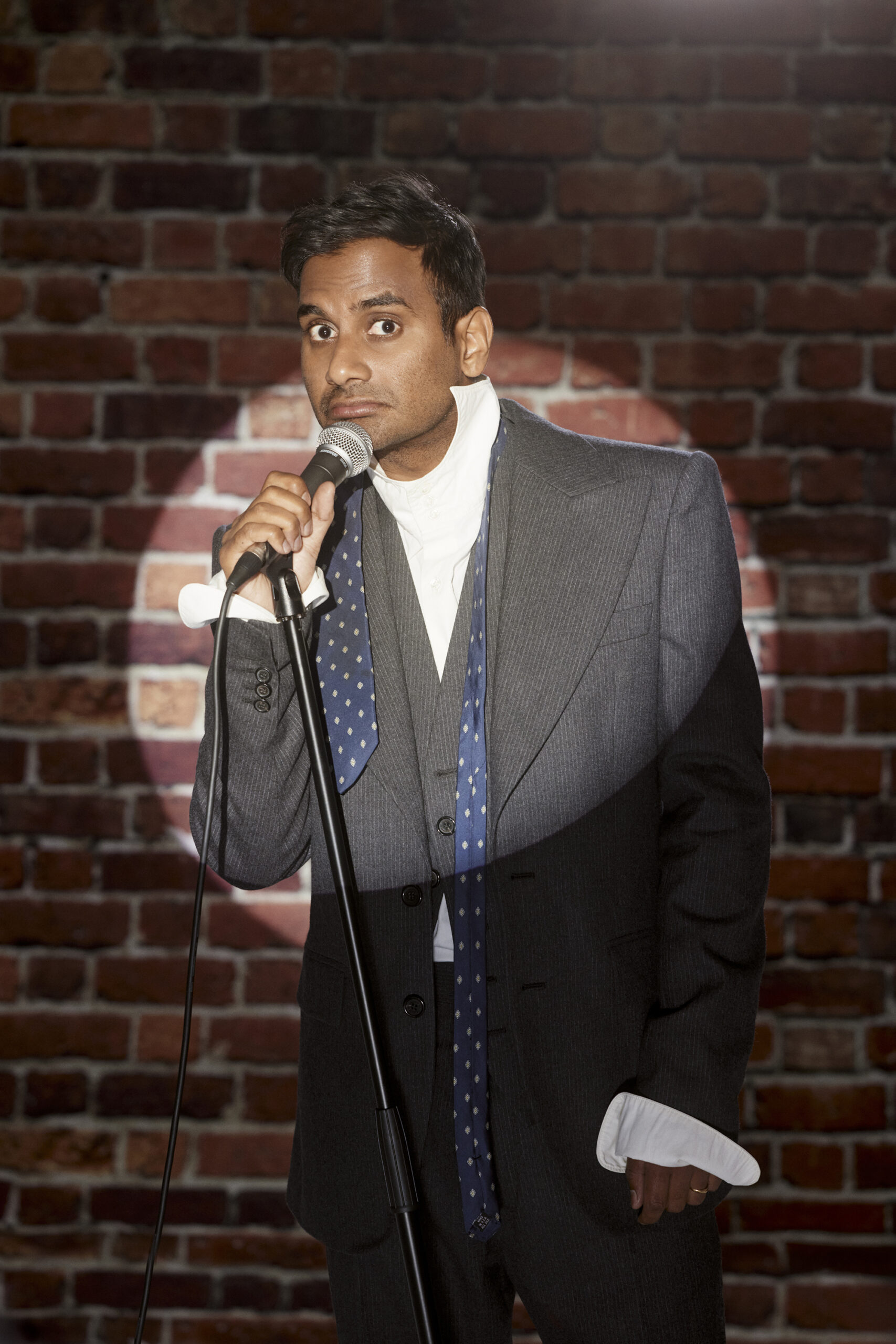
Aziz Ansari wears Suit and Vest Dsquared2, Shirt Bluemarble, and Tie The Society Archive.
After production was suspended on Aziz Ansari’s debut feature, Being Mortal, the comedian turned director is trying his luck with Good Fortune, a comedy about a clueless angel (Keanu Reeves) who upends the lives of a gig worker (Ansari) and a rich venture capitalist (Seth Rogan). It’s the type of mid-budget gamble Hollywood rarely makes anymore, so when Ansari and his buddy Steven Soderbergh got together in London to talk about the film, hot topics included test screenings, location scouting, and box-office stakes.
———
FRIDAY 11 AM AUG. 15, 2025 LONDON
STEVEN SODERBERGH: So, seeing the finished film, do you want my notes?
AZIZ ANSARI: It’s too late for notes. I’m locked. [Laughs]
SODERBERGH: I’m kidding. The new opening’s a lot better.
ANSARI: Oh, thanks.
SODERBERGH: Why don’t we use that as a jumping-off point to talk about process?
ANSARI: Should we give some context? Because I had my director’s cut, which I sent to you early on. I was very nervous, and you sent me the nicest text. Then I was able to shoot a couple more things because we had some extra days, because Keanu [Reeves] hurt his knee and couldn’t salsa dance with his broken kneecap, as much as he wanted to.
SODERBERGH: Well, I’m a big believer in reshoots or additional photography, because if you have the opportunity, why wouldn’t you go back and shore up or establish things more clearly? All of the things you shot I thought were really additive, but what I was going to ask was, once you’ve started and you’re shooting and you’re cutting, what is your process for getting feedback, assessing that feedback, and deciding whether to act on it?
ANSARI: It’s interesting for me, because doing stand-up, you get feed back every single night. When you’re working on a joke, so much of it is about refining. And with a film, it’s a lot more difficult. You can refine in the script phase, you do table reads, and you kind of get a sense, but getting an audience doesn’t come until much later. When we did Master of None, we’d do little screenings just to see what was getting laughs and if anything was confusing. What’s really hard is when you work on these things, you and all your collaborators can lose perspective, because you’re way deeper in it than anybody else. What was exciting about showing it to you was—
SODERBERGH: I knew nothing.
ANSARI: And you’re an incredibly smart guy.
SODERBERGH: My experience is that a note that comes from a friend is different from the same note that comes from the studio or the financier because you feel you friend is rooting for you. The person who paid for it is terrified. There’s a different reaction when you feel like the note’s coming from a place of anxiety as opposed to a place of, “Hey, I want you to win.”
ANSARI: And your friends are probably think more artistically.
SODERBERGH: Yes.
ANSARI: I saved all my friends for as late as I could, because there’s also value in the collective. We did a preview screening where they get 300 people in Burbank, but before that I did these tiny screenings where I used my stand-up list to kind of do what we did with Master of None and get a smaller group in, like 60 people. It was super valuable because you could get a quick sense of, “Oh, this scene is boring, or this doesn’t make sense to them.” That’s the stuff that’s really hard to predict.
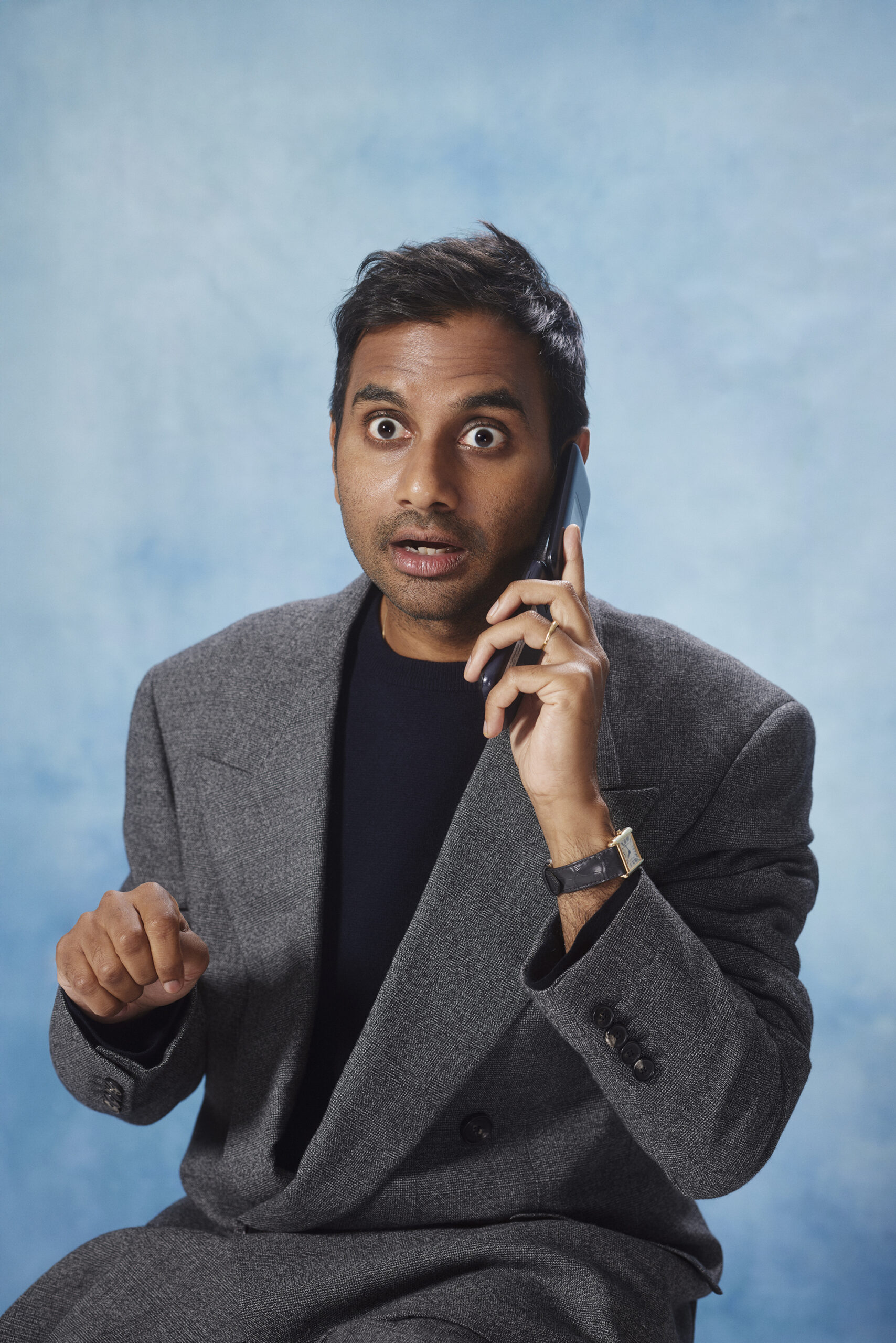
Suit and Sweater Loro Piana. Watch Cartier.
SODERBERGH: Normally I would assume somebody in your situation who’s writing, directing, and performing would be anxious about notes, because it would be difficult not to personalize that. But does your stand-up career enable you to have a thicker skin because you’re used to people just going, “I hate that,” right away?
ANSARI: [Laughs] Yeah. That’s what happens with a lot of my shows. People just point and go, “I hate that!” No, my skin is not thick. I think comedians have pretty thin skin.
SODERBERGH: Oh, really?
ANSARI: Yeah.
SODERBERGH: Wow. Aren’t you in the wrong job then?
ANSARI: Well, you’ve got to be really good, right? My nightmare was, we did that screening, and then they do a little Q&A afterwards. And they were like, “You have to sit through it.” I was like, “Are you kidding me?” They don’t know you’re sitting back there. Not only did I write and direct, but it’s my face on the screen, and they’re going to be like, “What’d you think about Aziz?” They basically give 300 people iPads and then they answer all these things, but the main thing they want to look at is, “Would you recommend?” We got “definite recommend” right away. We were back there, and the guy came over, he’s like, “We got the scores.” And our number was high enough to where—
SODERBERGH: Everybody relaxed.
ANSARI: Everybody relaxed. Our studio head, he was so happy. He looked like he had a tear coming down his eye, and he was like, “You guys could stay here and listen if you want, but I’m going home.” And I was like, “I’m riding with you. I don’t want to hear this.” But I was very thankful that it went well.
SODERBERGH: I used to sit through those and then I stopped, because they’re so excruciating.
ANSARI: It also seems like one person can dominate a group.
SODERBERGH: That’s what happened when we first previewed Out of Sight. It didn’t score particularly well, which wasn’t surprising. One guy raises his hand and goes, “I hate stories that are told out of order,” and that opened the floodgates. It was a pile-on of people being like, “I was confused, I didn’t know where I was.” I just was like, “Oh, my god.” And it never got back on track. So I make my producers sit through that while I go and have a drink, and they give me the highlights or the lowlights.
ANSARI: Yeah.
SODERBERGH: A different process question: How do your ideas develop? Walk me through the process on this movie.
ANSARI: Every movie I’ve written has been a little different. You have these lightning bolts, they stick in your head, and they have to be powerful enough to fuel you. Everything I’ve written that’s been made, or come close to being made, has been written on spec. I haven’t been paid to do it, so you’re kind of betting on yourself. And it’s based on a little germ that gets you going. For Good Fortune, four or five years ago I was in an Uber in Colorado, and I was writing with another comedian who was opening for me. We’d been on tour and we were talking about how much more homelessness we’d seen in all these cities. And the Uber driver jumps in, a hipster guy in his thirties, Caucasian, college-educated kind of guy. And he starts talking about how he lost his job, wasn’t able to make rent, and then he started sleeping in his car and showering in the gym. That really stuck in my head. I started reading all these articles and books about this kind of thing, and I realized, wow, this is a pretty widespread thing that people aren’t quite talking about and you’re not seeing in films.
SODERBERGH: Right.
ANSARI: Sometimes I’ll outline a thing, but with this I was like, I’m just going to start writing it. I remember reading something about the Coen brothers, where they said they never outline, they just write themselves into a corner and then figure it out. And if they can’t, they go onto another script and eventually go back to that corner. Their thinking is, if it was hard for us, it’s going to be hard for the audience to tell where it’s going. That was the loose approach I took with Good Fortune.
SODERBERGH: That makes sense.
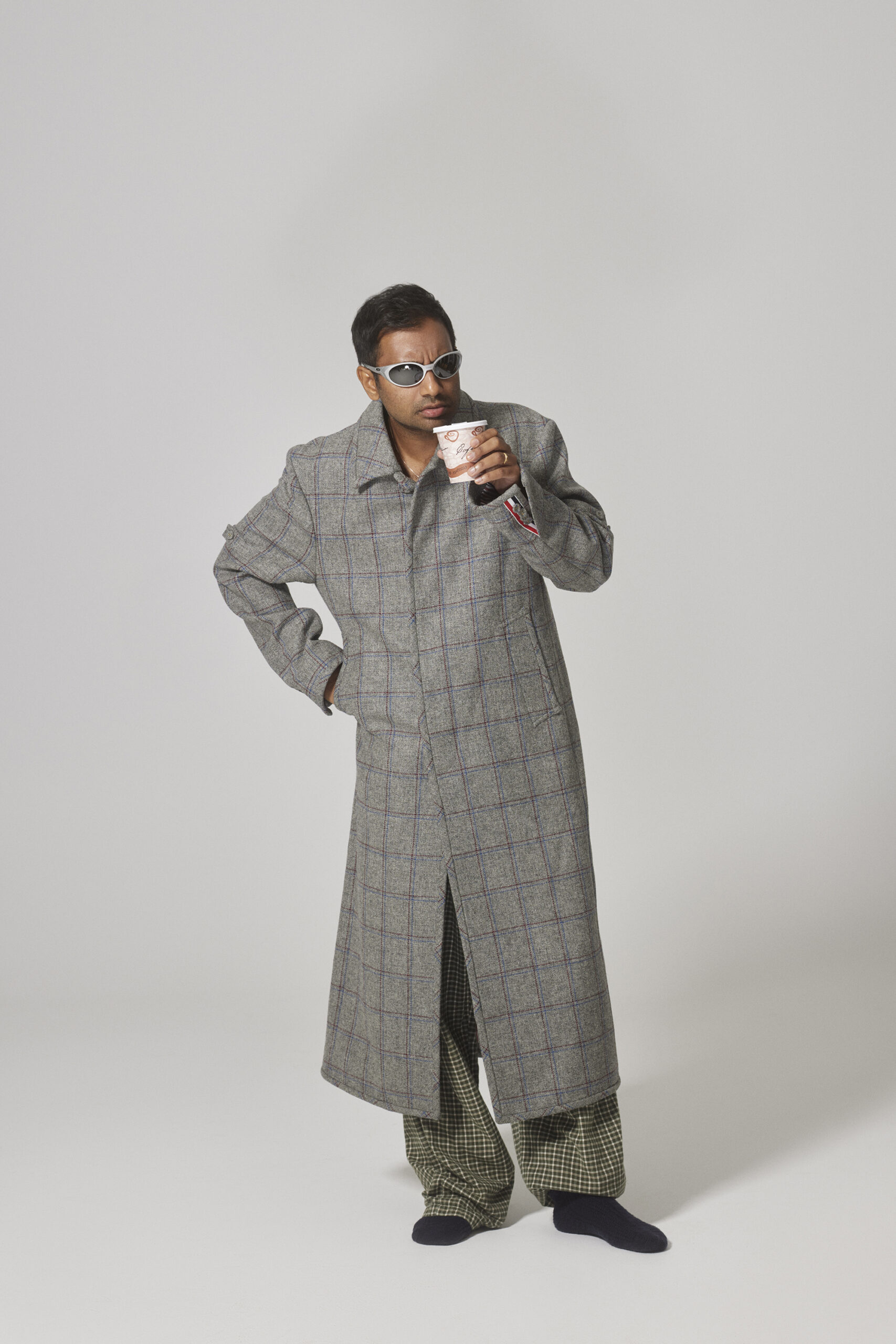
Coat Thom Browne. Pants The Society Archive. Sunglasses Oakley. Socks Loro Piana.
ANSARI: So I started with this idea of two guys: one guy who’s been blessed by the last 20 years, made money in tech, has a giant house with a pool, and the other guy who’s been having a tougher time. What happens when their worlds collide? I would get to about 30 or 40 pages where these guys meet each other, and then I didn’t know where it went. I had another idea where it was this concept of an angel coming and saying, “Hey, I’m going to show you something.” And then the guy’s like, “I don’t believe you. I’m right. This is wrong.” That was a long time ago, and my friend and I actually pitched it to Seth [Rogen], and then we could never figure it out. But I was like, that idea might be interesting to use in this.
SODERBERGH: So you were using that to solve a problem?
ANSARI: Yes. I used that plot device for this, and it fit better in this context. But the ending for this was really hard. There were a couple of times where I stopped, and I’d watch a bunch of movies that were related to Good Fortune. Whether it’s just about wealth inequality—from The Grapes of Wrath to Trading Places. You think, “How do you really make a statement about this?” And if you look at the ending of something like Umberto D. or Nights of Cabiria, it’s about the cherishing of life. In Nights of Cabiria, when she’s walking and the band is playing, I get emotional thinking of it. They’re very life-affirming things.
SODERBERGH: What I really liked is it had the quality, in my mind, of classic ’30s comedies that also dealt with these issues. Whether it’s Sullivan’s Travels or My Man Godfrey, which is a masterpiece, I thought it was deft in the same way that those films were. I’m curious, as I’m sure you are, to see how it performs, because I feel like it ought to. It’s very satisfying. You’ve got Seth at peak Seth-ness right now.
ANSARI: He’s great.
SODERBERGH: And Keanu in a perfect Keanu role. He is that character. The guy crushes every line reading. This is the trick: Can you get people to leave the couch and go? I feel like through timing and content, you’re teed up for this to perform. The industry is in such a state of precarity. When you’ve made something that doesn’t fit into the category of what people think is “working”—which means large-scale fantasy, IP, low-budget horror—if you’re not one of those, when something works or doesn’t work, people tend to look at it not just as an individual piece of art, but as a symbol of what’s happening in the film business at large. And that’s not necessarily a fair thing to lay at the feet of a filmmaker who’s just trying to make a good movie. But all that is to say, I’d be greatly encouraged if this works, because then people go, “We can make these.” The fear that I had, certainly with Black Bag when it underperformed, is people say, “See? Can’t do that. Can’t make a mid-level budget movie for grownups. Nobody shows up.” And then I feel like, “Shit, I’ve screwed the pooch for the person behind me.” So, no pressure. [Laughs]
ANSARI: All that is completely true, but I keep getting encouraged. I saw Weapons over the weekend and I was so glad it did well.
SODERBERGH: Really well.
ANSARI: Sinners as well. I root for all these movies. And those two in particular are very sophisticated films. When you deal with people on the other end, they act like these people going to the movies are so dumb and their instinct is to water things down. And when those movies succeed, you can go, “Uh-uh, they did plenty of weird stuff in those movies and people loved it.” If you play to people’s intelligence, if you act like the people watching it are smart, cool people, then hopefully they’ll rise to it. But look, I hope this works. As you said, all these pieces seem like they’re teed up. I would love for this to open the door not just for myself, but for other people to make interesting movies that are in this budget range. And I love those horror movies.
SODERBERGH: Me too.
ANSARI: It’s funny—when you talk about where ideas come from, I’ve had this one one-sentence germ of an idea for a horror thing which has been in my head for a couple of years, and I haven’t figured out where it goes. But I was really excited to do this as a comedy, because I’d kind of taken a break from them. For the third season of Master of None, I made a lesbian drama. And then I worked on a film based on this book Being Mortal [: Medicine and What Matters in the End], which was funny, but pretty heavy. So this is really for the audience that I’ve built. I’ve been kind of antagonizing them a bit, so this is giving the people what they want, I hope. If this doesn’t work at theaters, I don’t know what else I got for you, man.
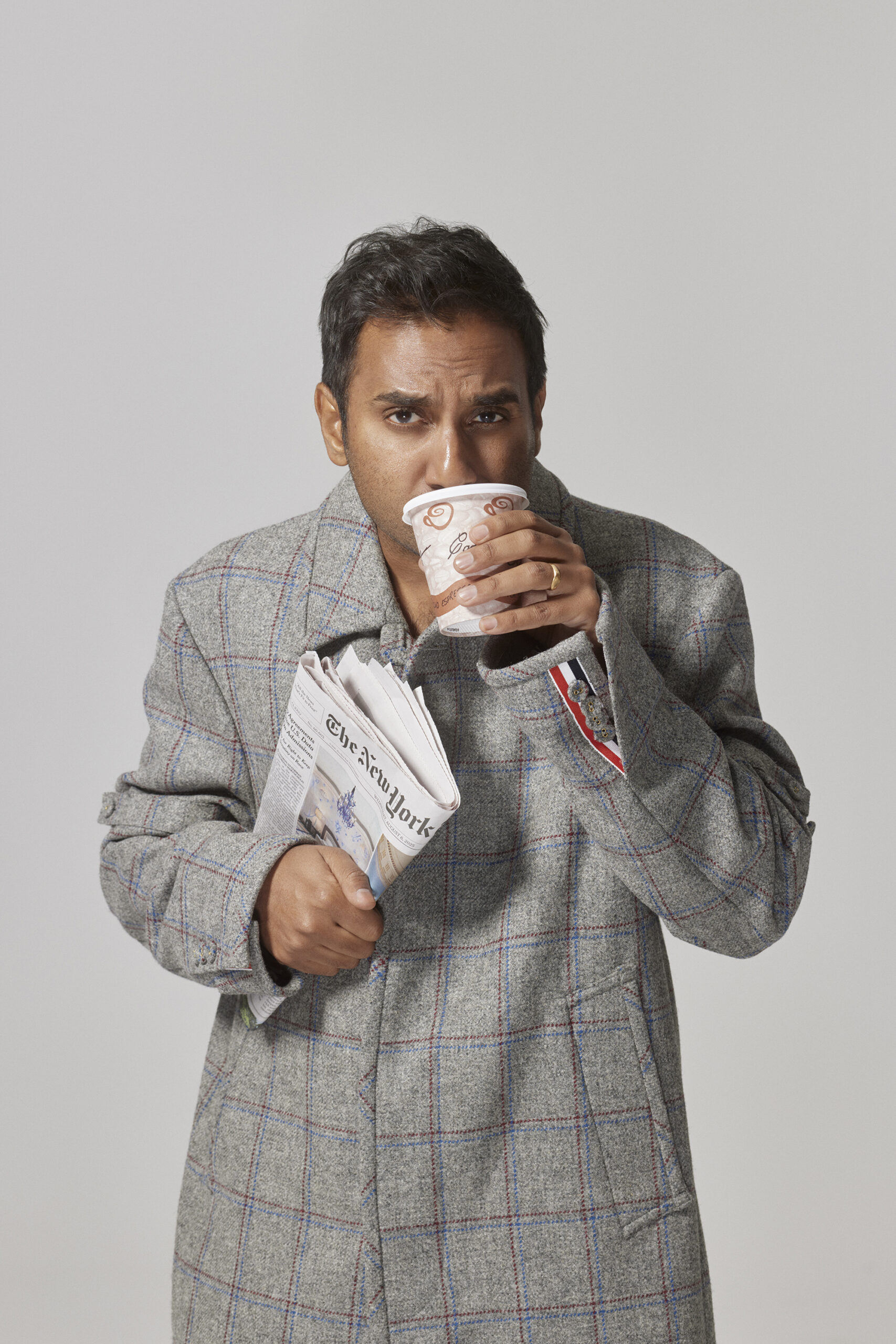
Coat Thom Browne. Pants The Society Archive. Sunglasses Oakley. Socks Loro Piana.
SODERBERGH: Are there difficulties in directing yourself and also directing cast? How do you give yourself a note? And then, how do you make sure the cast feels as taken care of as you are taking care of yourself ?
ANSARI: One thing that gives me a huge advantage is, I’ve been doing this for a long time. Master of None was 10 years ago, so I’ve been used to watching myself and adjusting. And I’m pretty critical of myself. When I watch playback of what I’ve done, it’s almost like it’s a different guy. I’m able to remove myself and adjust. But it’s strange because, maybe this is just in my head, but if you’re an actor and the director, it’s weird to go back into a scene and tell people stuff, because you’re supposed to be a team, the actors. But you’re way more part of the team of the crew, so it’s a trade-off.
SODERBERGH: What’s your least favorite part of the process? I’ll tell you what mine is later.
ANSARI: Probably two things: Trying to get the financing, and location scouts in the van.
SODERBERGH: Scouts.
ANSARI: Scouts is yours.
SODERBERGH: Hate it. I love being in the van with the—
ANSARI: I like the people. And we laughed a lot.
SODERBERGH: But it’s fucking boring and it just makes me crazy.
ANSARI: We have to explain this to people who don’t understand, because this is one of these things you don’t think about, right? If you write a scene where you say, “They’re in a—”
SODERBERGH: Castle.
ANSARI: Well, a castle scout sounds pretty fun. You’re going to go to a bunch of castles. But let’s say they’re in a laundromat. You have to go look at three or four laundromats. I have to give a shout-out to our location guy, Jay Traynor. But in this movie, one of the bigger challenges was finding Jeff ’s house—a house that could represent what it’s supposed to represent.
SODERBERGH: As somebody who goes into people’s houses, there’s no universe in which I would let a film crew shoot in my house, knowing what happens.
ANSARI: Well, you have to find someone that has a house that big, and also wants a bit of money to let you potentially fuck their house up. It got to a point where I was like, “Let’s just use my house,” and they wouldn’t let me do it. But my house isn’t anywhere near as spectacular as that one.
SODERBERGH: I feel like on almost every show, there’s always one location that you’re really having trouble with. People who don’t work on films wouldn’t understand that there are unheralded positions that are absolutely critical to the success of any project. One is a location manager. If you don’t have a great one, you have a problem. The other for somebody like me is, if I don’t have the triple-A-level dolly grip, I’m hobbled. I can’t build shots and scenes the way I want if I don’t have somebody working that thing who is absolutely the best. And when you think about it, it’s a weird job. You move this 350-pound piece of machinery around with somebody sitting on it, and dance with the cast. You don’t know what surface you’re going to have to deal with, and there’s no place to learn this. You have to learn by working on a movie and being taught by the person that used to do it and is now older. I never tire of watching the dolly grip and the grip department lay track down when I go, “I want to go from here to here.”
ANSARI: What’s so hard to me about movies versus TV is, TV is like, you build this team and then you work for a long time, and you guys get better as a unit, work through some kinks, and become a well-oiled machine. But we were shooting Being Mortal in L.A., so it’s not like I could bring all the people from Master of None from New York, so you have to change your team. Then I’m trying to do something in London and it’s like, well, we need to hire people locally. So every time you’re starting with a new group and you have to try to form a new well-oiled machine as quickly as possible. I don’t think I realized what a miracle it is to make a movie until now. Every time I finish watching a movie, I read the Wikipedia page.
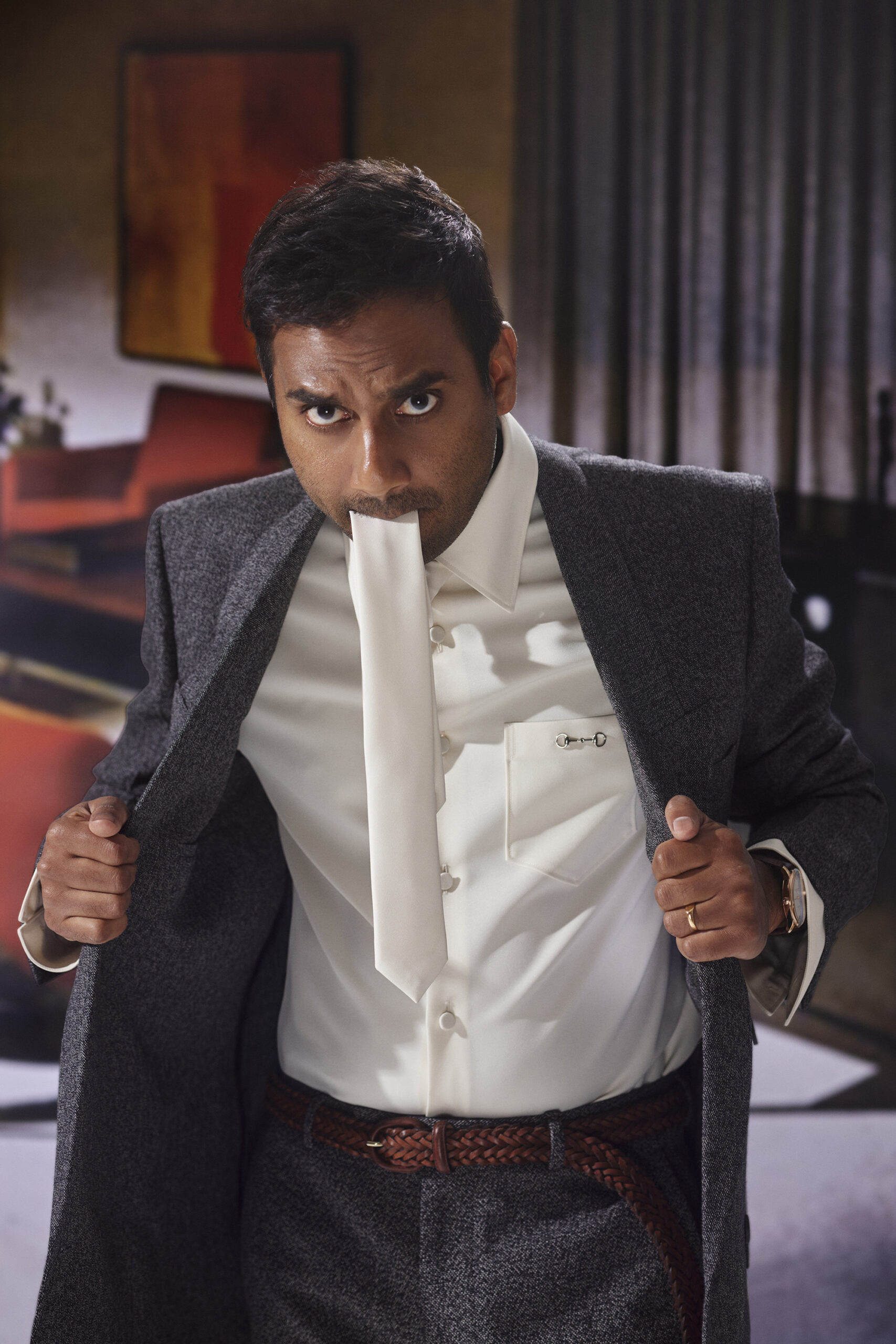
Suit, Shirt, and Tie Gucci. Watch Omega. Belt The Society Archive.
SODERBERGH: To hear the stories.
ANSARI: Yeah. People always ask me, “What’s the difference between stand-up and movies?” I say, “Stand-up is like you train to run a race, you go to different cities and you run around the track, and then you get your check and you’re done.” A movie is like, you go to these people and say, “Hey, I want to climb a mountain.” And they’re like, “Okay, how much money do you need?” And then I say, “This much money and these are supplies I need.” And they’re like, “Well, can Brad Pitt climb the mountain with you? What about George Clooney? Could Glen Powell climb the mountain with you?” And if you’re like, “Hey, I can’t get Glen Powell,” “Alright, we have to take away some of your supplies.” And then you finally get some people and they start letting you climb the mountain, and then boulders start getting thrown at you and you have to dodge them.
SODERBERGH: And as everybody who climbs mountains knows, people get hurt on the way down more than they get hurt on the way up.
ANSARI: Now you got me scared again.
SODERBERGH: How do we wrap this up in a way that will satisfy readers of Interview? Are you doing a photo shoot?
ANSARI: We did it already.
SODERBERGH: How did that go?
ANSARI: That was fun.
SODERBERGH: That is my worst nightmare. I won’t sit for that. I stopped a long time ago.
ANSARI: That stuff I don’t mind. But again, I haven’t done a big press thing—
SODERBERGH: For a while.
ANSARI: And then I was like, “I’m not going to do this stuff. I don’t need to.” Because Netflix was always like, “If we put it on the front page, everybody’s going to see it.” Which was very true for a while, but now there’s so much stuff, if you don’t get out there and really promote—it’s part of the job. So I’m doing this with you. After this, I’m going to go eat a bunch of Indian food with these two British guys on YouTube. That’s a thing now. Everything has changed. But I’m happy to do it.
SODERBERGH: I love Indian food.
ANSARI: Cool.
SODERBERGH: Well, I hope they can make sense out of that. They told us to keep it to an hour and we went over.
ANSARI: You did a great job. Thank you.
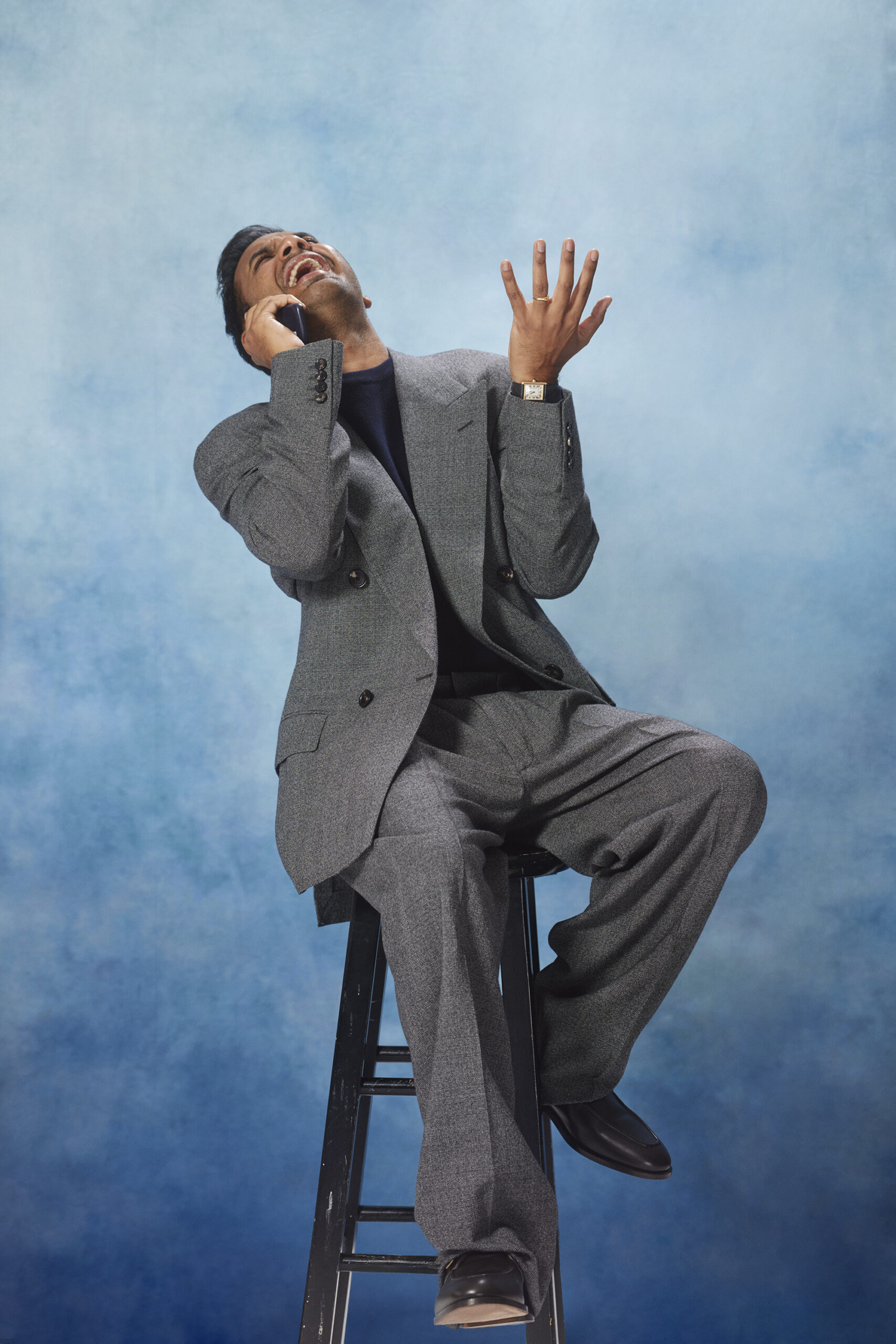
Suit, Sweater, and Shoes by LORO PIANA. Watch by Cartier.
———
Grooming: Rheanne White using Bumble and Bumble at Tracey Mattingly.
Photography Assistants: Eve Alpert and Gabriella Talassazan.
Fashion Assistant: Izaake Zuckerman.
Production Assistant: Abby Lorenzini.
Post-Production: Nikita Shaletin.
Location: Shio Studios.
Special Thanks: Jason Lê.

